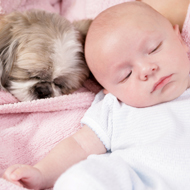Pets may protect children from allergies, study finds

Early exposure to animals could protect children against some allergies.
People who share their homes with animals share some of their pet's gut bacteria, according to new research.
The study, published in the Journal of Allergy and Clinical Immunology, may explain why early exposure to animals could protect against some allergies.
Dr Merja Nermes from the University of Turku in Finland and co-author of the study said: "Earlier it was thought that exposure to pets in early childhood was a risk factor for developing allergic disease.
"Later epidemiological studies have given contradictory results and even suggested that early exposure to pets may be protective against allergies, though the mechanism of this protective effect have remained elusive."
She told news agency Reuters Health that adding pet microbes to the infant intestinal biome may strengthen the immune system.
Now she and her colleagues want to see exactly how exposure to pets might influence the immune systems of children.
"Future research is needed to assess if these infants develop less atopic dermatitis, asthma or allergic rhinitis later," she said.
She added that paediatricians should not advise parents to avoid having pets in the home for fear of allergies.
“If a family with a pregnant mother or an infant wants to have a pet, the family can be encouraged to have one, because the development of allergic disease cannot be prevented by avoiding pets," she explains.



 The Veterinary Medicines Directorate (VMD) is inviting applications from veterinary students to attend a one-week extramural studies (EMS) placement in July 2026.
The Veterinary Medicines Directorate (VMD) is inviting applications from veterinary students to attend a one-week extramural studies (EMS) placement in July 2026.